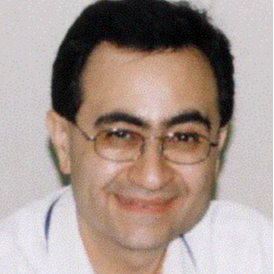
M-R. Akbarzadeh-T
Work place: Dept. of Electrical and Computer Engineering, Center of Excellence on Soft Computing and Intelligent Information Processing, Ferdowsi University of Mashhad, Mashhad, Iran
E-mail:
Website:
Research Interests: Computational Science and Engineering, Computational Engineering, Computer systems and computational processes, Robotics, Operating Systems, Data Structures and Algorithms
Biography
Mohammad-R. Akbarzadeh-T. (Senior Member, IEEE) received his Ph.D. on Evolutionary Optimization and Fuzzy Control of Complex Systems from the department of electrical and computer engineering at the University of New Mexico in 1998.
He currently holds dual appointment as professor in the departments of electrical engineering and computer engineering at Ferdowsi University of Mashhad. In 2006-2007, he completed a one-year visiting scholar position at Berkeley Initiative on Soft Computing (BISC), UC Berkeley. From 1996-2002, he was affiliated with the NASA Center for Autonomous Control Engineering at University of New Mexico (UNM).
Dr. Akbarzadeh is the founding president of the Intelligent Systems Scientific Society of Iran, the founding councilor representing the Iranian Coalition on Soft Computing in IFSA, and a council member of the Iranian Fuzzy Systems Society. He has received several awards including: the IDB Excellent Leadership Award in 2010, The IDB Excellent Performance Award in 2009, the Outstanding Faculty Award in 2008 and 2002, the IDB Merit Scholarship for High Technology in 2006, the Outstanding Faculty Award in Support of Student Scientific Activities in 2004, Outstanding Graduate Student Award in 1998, and Service Award from the Mathematics Honor Society in 1989.
His research interests are in the areas of evolutionary algorithms, fuzzy logic and control, soft computing, multi-agent systems, complex systems, robotics, and biomedical engineering systems. He has published over 250 peer-reviewed articles in these and related research fields.
Author Articles
Qualitative and Quantitative Evaluation of EEG Signals in Epileptic Seizure Recognition
By S. A. Hosseini M-R. Akbarzadeh-T M-B. Naghibi-Sistani
DOI: https://doi.org/10.5815/ijisa.2013.06.05, Pub. Date: 8 May 2013
A chaos-ANFIS approach is presented for analysis of EEG signals for epileptic seizure recognition. The non-linear dynamics of the original EEGs are quantified in the form of the hurst exponent (H) and largest lyapunov exponent (λ). The process of EEG analysis consists of two phases, namely the qualitative and quantitative analysis. The classification ability of the H and λ measures is tested using ANFIS classifier. This method is evaluated with using a benchmark EEG dataset, and qualitative and quantitative results are presented. Our inter-ictal EEG based diagnostic approach achieves 97.4% accuracy with using 4-fold cross validation. Diagnosis based on ictal data is also tested in ANFIS classifier, reaching 96.9% accuracy. Therefore, our method can be successfully applied to both inter-ictal and ictal data.
[...] Read more.Other Articles
Subscribe to receive issue release notifications and newsletters from MECS Press journals